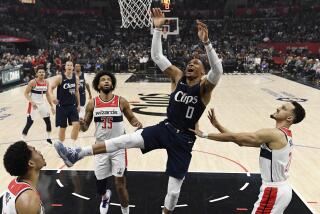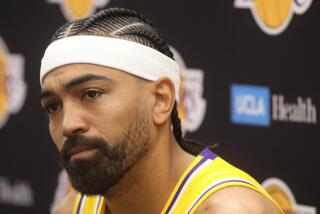McAdoo’s Wrist Still Hurting, but He Delivers
- Share via
PORTLAND — No can really explain exactly what is wrong with Bob McAdoo’s sore right wrist. X-rays showed no fracture, and it isn’t believed to be a muscle strain, sprain or tear, either. Team doctor Stephen Lombardo and trainer Gary Vitti think it might have been caused by a chemical imbalance in McAdoo’s system.
“Sometimes,” Lombardo said, “there is no diagnosis. We aren’t certain what it’s related to.”
All McAdoo knows is that the wrist and thumb on his shooting hand have been cramped and sore for the past week. It bothered him so much Tuesday night in Game 2 of the Lakers’ playoff series against Portland that he missed all seven shots he attempted.
For a veteran whose primary function is scoring, this was quite a problem for McAdoo. It was still bothering him when he stepped on the court here Friday night in Game 3, and McAdoo was worried that his shooting would again be affected.
But fortunately for the Lakers, the pain in McAdoo’s wrist subsided, and he played his best game of the series at a time when the Lakers clearly needed help from the big man off the bench. He scored 23 points--7 of 13 from the field and 9 of 9 free throws--in 30 minutes of the Lakers’ 130-126 victory.
“I was kind of nervous coming into the game because the wrist still hurt,” McAdoo said. “It hurt in the first quarter, but in the second quarter, it started feeling better, so I started shooting better. I could feel my shot more.”
While Lombardo seemed hesitant to give details of McAdoo’s peculiar condition, Vitti could only speculate that the pain and cramping was caused by an “electrolyte imbalance” (i.e. a depletion of nutrients such as sodium and potassium).
“An electrolyte imbalance, basically, makes you dehydrated when you sweat too much, and you can cramp,” said Vitti, who said he didn’t know why it affected McAdoo’s right wrist and no other part of his body.
McAdoo, who said the condition has occurred previously but not this season, had his theories, too.
“I think I’ve got rheumatism or something like that,” McAdoo said. “It was probably brought on by a bad cold. I’m missing a lot of zinc and potassium, and I wasn’t replenishing the fluids in my body. It just came up in the wrist area, I don’t know why. Maybe I fell on the wrist too much earlier in my career.”
Or maybe, as some teammates might joke, the pain in the wrist is caused because McAdoo shoots so much. But the Lakers want McAdoo to shoot--when he’s hitting.
In the first two games of the Portland series, McAdoo had scored just 7 and 2 points, respectively and was a combined 2-of-15. But because the Lakers easily disposed of the Trail Blazers both games, McAdoo’s cold shooting didn’t hurt them.
Friday night, though, when the Lakers were involved in their first close game of the playoffs, they turned to McAdoo for help, and sore wrist or no, he produced.
When Kareem Abdul-Jabbar went to the bench with three fouls early in the second quarter, with the Lakers leading by only six points, McAdoo helped lead Los Angeles to a 72-56 halftime lead. He scored 10 points in that stretch, four of his five baskets coming on jump shots.
In the second half, when the Lakers were clinging to the lead, McAdoo played the final 16 minutes and scored 10 points. Just as important, he had nine rebounds while playing both center and power forward.
“I told Mac when I put him in there not to worry about his shooting, but to play good defense and rebound, which he did,” Laker Coach Pat Riley said. “We knew his hand had caused him problems, but with a shooter like Bob, you just let him keep shooting. He eventually starts hitting. But after he missed his first three shots, I was wondering.”
So was McAdoo. But he said his teammates encouraged him to keep shooting.
“I’ve got to have the wrist healed to shoot well,” he said. “It comes and goes. It just started this series. It got so bad the other day I couldn’t even hold the ball. But once I got the feel back in the second quarter, I knew I’d be all right.”
More to Read
All things Lakers, all the time.
Get all the Lakers news you need in Dan Woike's weekly newsletter.
You may occasionally receive promotional content from the Los Angeles Times.








